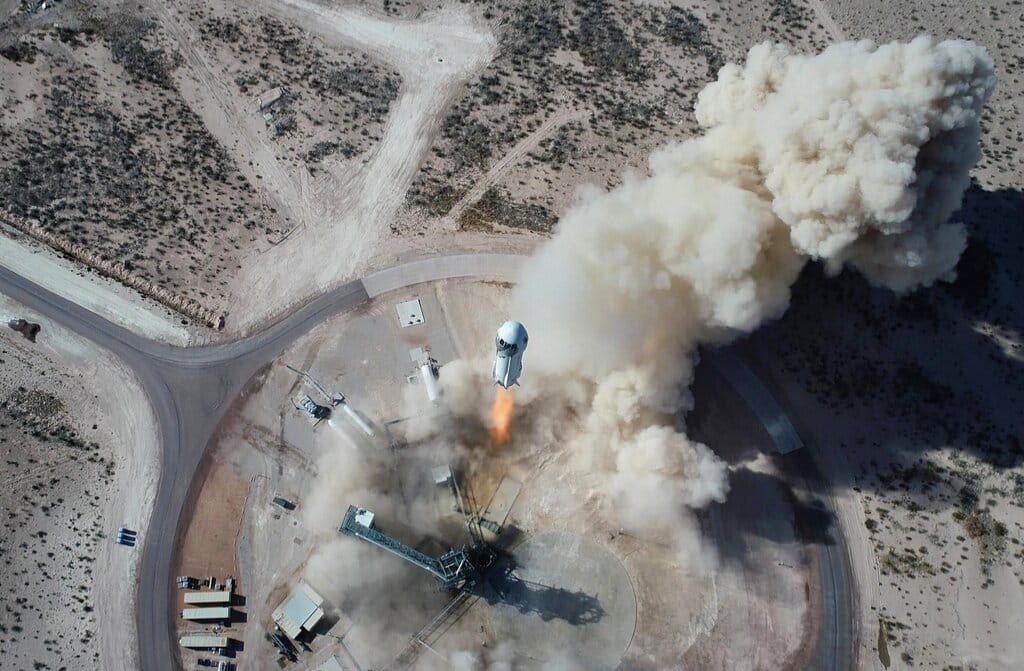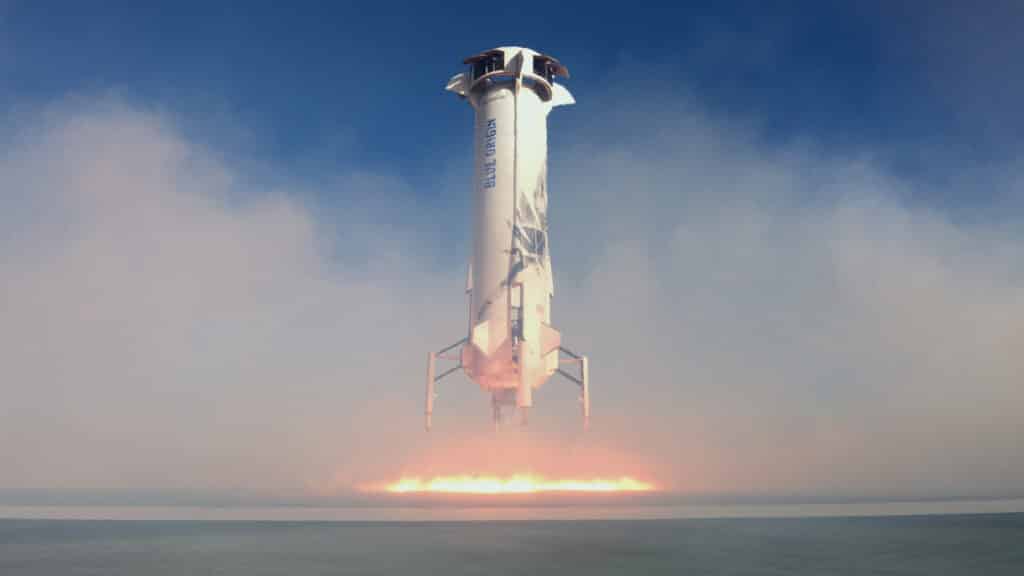Edward Ludlow Bloomberg News
Jeff Bezos is headed to space. But first he has to pass through Van Horn, Texas.
A dot on the map along Interstate 10 between El Paso and San Antonio, Van Horn, population less than 2,000, considers Bezos a neighbor. From the town’s main drag, it’s just a 40-mile drive to Blue Origin’s launch pad, where he intends to rocket into space for a few minutes in his Blue Origin spacecraft on July 20. As distances go in this part of Texas, that’s next door.
A two-mile strip book-ended by 2 truck stops, Van Horn is about 100 miles from the nearest town and is, in fact, the only one in all of Culberson County, nearly 4,000 square miles of arid scrublands and mountain ranges, including Guadalupe Peak, the highest mountain in the state. Aside from Van Horn, there’s only a nearby ghost town.
The few inhabitants of this vast patch of West Texas have typically sustained themselves through ranching, mining and irrigated farming. Next week its newest industry will take center stage when Bezos, the world’s richest man, and three other civilian crewmembers take off on Blue Origin’s space flight, headed some 60 miles above Earth. While Bezos takes to the skies, the town’s citizenry will be wondering just how his space obsession may change their lives and fortunes — if at all.
The launch has been years in the making since Bezos acquired a sprawling parcel of land for his spaceport in 2005. The company completed the main launchpad for its New Shepard rocket in 2014 and has added other facilities for engine testing, rocket housing, and a training facility and lounge called Astronaut Village where Bezos will wait before boarding his spaceship.
Blue Origin has also been building in town: One 48-unit apartment building on the town’s main street, along with 12 single-family houses. All of these have filled up with mostly well-paid, highly educated employees, mostly from out of state, including families who now call Van Horn home. Several have since joined the local school board and the town council and some have joined up as volunteer firefighters.

But Blue Origin has otherwise mostly kept the town at arm’s length. Few if any of the currently 275 full-time jobs at the spaceport have gone to townspeople, who say they don’t know much about what goes on out at the launch site. And when they try to find out from engineers and rocket scientists whose paths they sometimes cross, they’re often told that Blue Origin staff are under nondisclosure agreements.
“Almost anyone that works there is very closed-mouthed,” says Jon Means, who runs the Means Ranch, south-east of Van Horn in Jeff Davis county. “You ask them where they ate lunch and they’ll hardly tell you.”
Blue Origin, of course, isn’t the only billionaire-backed space company to set up in Western states and sometimes alienate locals. Elon Musk’s Space Exploration Technologies Corp. was accused of bullying residents into selling their houses in Boca Chica, Texas. In New Mexico, Richard Branson’s Virgin Galactic persuaded the state to fund a $215 million spaceport where Branson took off on July 11, then safely glided back to a landing strip on the site less than an hour later.
Back in Van Horn, Means makes the trip into Van Horn regularly to buy groceries for his family and to fill up his truck with gas. He says he’s got nothing against Bezos and Blue Origin — the space company’s activities haven’t disturbed his cattle, for one thing — and he thinks over time county tax revenue from Blue Origin will benefit the town.

But that’s pretty much where the space-age boom stops for Van Horn as Means sees it. If anything, Blue Origin’s presence has caused the city’s annual budget to take a hit.
Historically, Van Horn had been a low- and moderate-income town that qualified for state and federal grants to help pay for infrastructure like roads and new water tanks. Now, the influx of high-paid engineering staff has changed its demographics, making Van Horn ineligible for those grants.
Blue Origin says it has helped bring in more than $1 million for the community through grants to the benefit of the school district, food bank and town infrastructure. The company says it also has an agreement with the school district to support higher education and job skills funding.
City officials confirm that Blue Origin has written letters to support the town’s attempts to get funding for various projects. And personnel from the spaceport have given classes on robotics at the local high school and engaged in tutoring.
For some locals, such measures bode well for the future. “It used to be there’s Van Horn here and Blue Origin over there,” the city’s mayor Becky Brewster says, explaining the two haven’t had much to do with each other since Bezos’s space company first showed up.
“They’re now starting to integrate. It’s just going to get bigger, the launches are going to get more frequent.”
Brewster and her family go way back. Before becoming Van Horn mayor last year, she had been a city administrator for 30 years until 2009. Her father, Okey D. Lucas, was also once the town’s mayor. Its municipal park is named after him. She’s hopeful Blue Origin will do more than bring in space tourists and step up local infrastructure investments, including more housing.

Ron Buxton arrived in town five years ago to become pastor of the Van Horn Community Church. He also runs the town’s only coffee shop and his wife works at one of the truck stops. When the couple arrived from El Paso, Buxton was also hopeful that Bezos and his spaceport would inject the town with new energy and keep younger people from moving away in search of jobs.
“When I first got here I thought this town was going to take off. That it was going to be a boomtown,” Buxton says. “I don’t get that impression anymore.”
Even so, the town’s people are ecstatic about the July 20 mission, Buxton says. Too bad the only way they’ll get a close look is on their TVs. Highway 54, which leads to the launch site, will be barricaded at about 11 miles from the spaceport’s perimeter.



